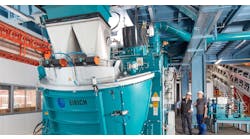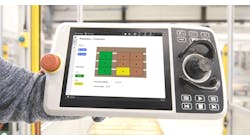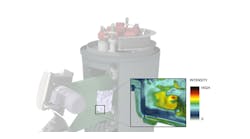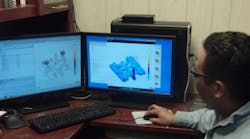Spokane Industries is a company that includes a steel foundry, a ferrous investment casting foundry, and a metal fabricating business. Its operations cover more 240,000 sq.ft. of production space in Spokane, WA, and its customers span a range of manufacturing interests: aerospace, construction and agriculture, transportation, aggregate processing, and general manufacturing.
Those customers rely on Spokane for more than castings: they count on the company to address their own design and production problems.
The Spokane Steel Foundry division is the core operation of Spokane Industries, having supplied commercial and industrial customers around the world for over 50 years. Some of its current customers were among the foundry’s original accounts, even ordering castings from their original patterns.
Today, the foundry’s products include durable wear parts for impact crushers, and a variety of high-specification castings for construction, mining, manufacturing, transportation, aluminum, and defense manufacturing. Decades of growth have established Spokane Industries as an environmentally sound and technologically advanced organization, working with customers using technological resources that include Magmasoft® process optimization software. By adopting Magmasoft (www.magmasoft.com), Spokane quickly discovered how the software’s ability to simulate the casting process from start to finish not only was invaluable as an engineering tool, but one that enhanced the entire business.
“Having Magmasoft has improved our ability to reduce the number of samples and bring quality products to market faster through meeting specifications, tolerance, and metallurgy, most often on the first run,” CFO Ken Vorhees reported.
“This is a very powerful tool, giving us the ability to see virtually the entire casting process before we have invested significant time and materials,” added Tyrus Tenold, president of the foundry division. “We now catch problems before they become problems. By the time we are ready to run the part, we have confidence we will have a quality part on the first run, in most cases.”
Using the software to run detailed process optimization for the casting process means that Spokane can identify process issues anywhere in the production sequence before the first run. Thus, foundry engineers discover a casting’s potential problems before an order arrives at the melt deck. They’re also able to resolve them faster than any competitor not using simulation technology.
Having licensed Magmasoft two years ago, Spokane now has recorded some significant changes in its casting process. “We use the software to help customers refine their designs, as well as to convert many of their weldments into castings,” according to Rod Grozdanich, technical director. “Being able to simulate the entire process helps a lot, in that regard.”
The simulation program has been established now among the foundry’s marketing tools, supporting its message about advanced production technologies, and demonstrating its claim to work the latest technology and equipment.
“By having Magmasoft, we find that our customers expect more of us,” explained Antonio Melendez, design engineer. “We are confident that we can deliver, and have always lived up to and exceeded the challenges our customers have given us.
“It has become common that when we go back to a customer with a design change that affects them—costs them more money, like adding a riser—they want to know why. Magmasoft gives us that credibility and additional technical support for our case,” he detailed
David Jolin, quality assurance manager, noted examples of current and potential customers requiring Spokane Steel Foundry to run a casting design through a solidification program. “There have been times where we have been told directly that in order to be awarded a particular job, we’d need to show them simulation capability,” Jolin said. And he added, “We are seeing this as a requirement more often nowadays.”
Cost justification
An important aspect of justifying the investment in the software was to be able to review past orders, simulating design changes toward improving the quality of the castings for future runs.
“We found many jobs that we set up with our previous simulation software where we really couldn’t see the shrink,” Grozdanich said. “And now, with Magmasoft, we can see what’s happening and we can fix it. We had chronic problems on some jobs that we just could not solve, and with Magmasoft we have been able to go back and fix all of them.”
Simulating the entire process from casting design to finished part helps save time and money by creating all the changes and making all the mistakes in virtual time and space, rather than during real production conditions.
“We are trying to minimize the number of samples before releasing a casting for production,” Melendez stated. “The idea is to do all the tweaking on the computer without spending money to pour multiple samples. This year, we have significantly reduced the number of samples and are more likely to produce a quality part on the first run.”
In addition to the ability to simulate the casting process, Spokane Industries has developed a partnership with MAGMA Foundry Technologies Inc. by taking advantage of resources extended to the software licensees. “The user group meeting every year is a very good tool to keep us informed of new developments and get everyone up-to-speed on anything we feel we would like to improve upon. Peer-to-peer discussions on how we each utilize the software are invaluable,” Melendez said.
Full Deployment
Of the four capabilities comprising Spokane Industries’ Magmasoft license—filling simulation, solidification simulation, heat treatment, and stress analysis—the foundry deploys each one of these processes to the fullest extent, including macro segregation simulation.
“In the last 10 months, on the dozen or so new projects we have put out, all but one or two were quality parts on the first run,” according to Grozdanich. “Our time- to-first-quality-part has therefore been greatly reduced.” In particular, shrinkage issues had been tough for Spokane Industries’ engineers to solve, but that has improved significantly thanks to simulation, according to Jolin.
“One of the main advantages of the software is that one can see roadblocks before they actually happen, and can compensate for them,” Melendez offered, “specifically with predicting the distortion of the casting, or other issues that might arise before we actually build it.”
In addition, the software helps the engineers derive a deeper understanding, and provides clues to what may be happening when developments don’t seem to make sense. Magmasoft then works as a reliable troubleshooting tool.
“The software verifies what is going on, gives clarity, and not only enables us to pass on an opinion, but it provides credibility to support our opinion to our customer,” said Antonio Melendez.
“The software is able to set particular processing parameters,” he continued. “For example, when pouring through a sleeve with a filter, there were scrap issues with the filters breaking. After doing some simulations and flows through that method, we could see that for one ladle we needed to use an inch-and-a-half diameter nozzle; that way, the flow is just right for this particular set-up.
“Each casting is different,” Melendez noted. “The number of iterations is different. It is more a question of how tough is the problem. For example, if you have a part with isolated hot spots and you don’t have clear filling patterns, you are going to struggle. The advantage with Magmasoft is you can see those trouble spots and focus on resolving the issues before creating the first sample. Even if you need to do 200 iterations in the right direction, that’s okay because we are no longer shooting in the dark.”









